Arts & Entertainment
Pride entertainers
Diverse group of acts slated to be on the main stage
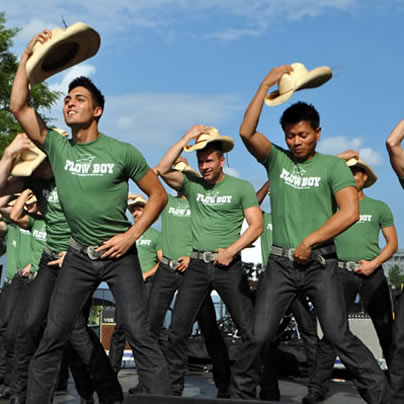
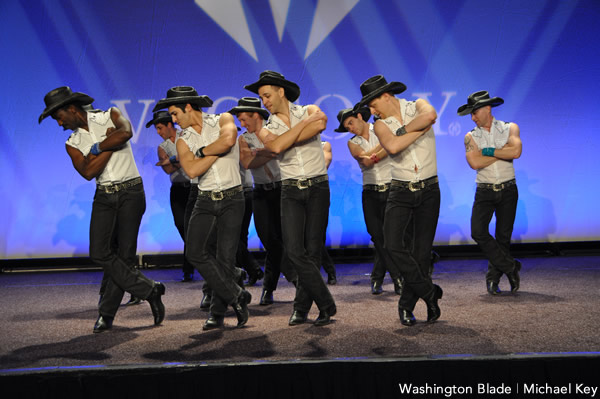
Look for the D.C. Cowboys’ farewell performance this summer at Capital Pride. (Blade file photo by Michael Key)
Blade staff spoke with several performers slated to appear on the Capital Pride festival stage Sunday. Here are some of the highlights.
Headliner Deborah Cox remembers performing at Capital Pride once before. The heat is what stands out in her mind. When she’s not traveling — she guesses she’s on the road about 70 percent of the time — she enjoys spending time with her husband and three children (ages 8, 5 and 3). As one might imagine, she loves classic R&B and says she owns every album Michael Jackson, Stevie Wonder and Aretha Franklin ever released. She’s exploring more jazz — Billie Holiday, Ella Fitzgerald — these days.
She plans a 30-minute set at Capital Pride.
“I always research what songs did well in certain markets so it will be a custom show,” she says. “And it will be fierce.”
Crystal Waters’ newest single, “Le Bump,” with Yolanda Be Cool, was released in 2011.
STAY ON TOP OF ALL THINGS PRIDE! DOWNLOAD THE DIGITAL PRIDE GUIDE TODAY!
Overall, Waters has 16 No. 1 and top 10 singles in more than 15 countries. She had two other songs make the Billboard Hot 100, “What I Need” and “Say … If You Feel Alright.” She had several other songs hit the U.S. Dance charts, including five number ones.
Waters was nominated for three American Music Awards in 1991, an MTV Video Music Award and four Billboard Music Awards in 1994, winning Top-Selling Hot Dance Music Club Play Single for “100% Pure Love.”
The D.C. Cowboys are prepared for an emotional final Capital Pride appearance.
Founder Kevin Platte — one of this year’s Pride heroes — isn’t sure where or when the final performance will be, he says this is “absolutely” their last time at Capital Pride.
“I just want folks to remember us as a group that left smiles on the faces of people who watched us,” Platte says. “We’ve always had such a good time doing it, we just want to make sure we’ve passed that on to our fans and the people in the audience as well.”
Alma Tropicalia is also slated to perform.
“The LGBT Community has seen some great victories this year and D.C. Pride is a great way for us to celebrate that,” says gay member Bill Dempsey. “Alma Tropicália is all about recognizing diverse backgrounds, so playing at Pride makes a lot of sense for us artistically.”
The band released its first recording in April — a self-titled EP available for digital download. Expect big percussion and a mix of styles at the band’s Pride performance.
“Life is a journey,” says hunky gay singer Aiden Leslie, another Pride singer. “And I am expressing this journey through my music.”
Leslie has never performed in D.C. and is looking forward to rocking it out and kicking off an exciting summer. He will be starting off his time in Washington with a special performance with Pepper MaShay at Secrets. He is also planning on debuting a new single on the Capital Pride stage along with three other songs.
Ani Hesse, 13, has been attending pride events with her two moms, Dana and Dale, for as long as she can remember, but this year’s Capital Pride marks the first time that she will be part of the entertainment.
“I’m so excited,” says Ani. “I love performing for big audiences. I can’t wait.”
Crys Matthews performed at Capital Pride last year, but this year’s performance will have a special significance: her fiancée will be in the audience. Matthews and her partner recently became engaged and plan to marry in 2013.
She thanks the organizers of Capital Pride for the chance to perform for D.C.’s LGBT community again and for the incredible work they do in “bringing our diverse community together.”
Simulover is two out performers: famous DJ and producer Alex Lauterstein and singer and producer SIRPAUL. Lauterstein and SIRPAUL think of themselves as “partners in crime.” They met 12 years ago when Lauterstein was the first DJ to play SIRPAUL’s song. They always knew they wanted to work together and when they finally got their schedules synced Simulover was born.
“It is time to go beyond labels,” SIRPAUL says. “It’s not gay marriage, it is marriage, and it isn’t ‘cute that you are married’; It’s what two people who love each other do.” SIRPAUL recently married his husband Paul and feels strongly about eliminating the labels that hold our community back.
Both Lauterstein and SIRPAUL have been involved in the gay community and culture for years and the community and culture influences their music. They believe they have something to offer everyone and hope to see a large D.C. crowd at their Pride performance.
Xavier Toscano loves Pride festivals because they give the community a chance to get together and celebrate our lives and our accomplishments. It is not all about the glitz and glamour but instead about living our lives and being happy with ourselves.
Toscano, who was afraid of performing early on has now overcome many of those fears, although right before he gets on stage he is going through his performance in his head, and “hoping he doesn’t forget his lyrics,” which he shyly admitted to doing early on in his career. He promised to not forget his lyrics for Capital Pride and put on an amazing show.
At last year’s Capital Pride, Consuelo Costin performed in front of about 400,000 people. “I had a great time. With the pulse, the drive, the energy, being around such diversity all celebrating one cause, was a memorial experience.” Costin says.
She’s straight but staunchly supports the gay community because she feels strongly about equality and people being who they are. Costin will be back for this year’s D.C. pride, bringing another awesome show. She’ll also perform at Los Angeles Pride.
Sports
English soccer bans transgender women from women’s teams
British Supreme Court last month ruled legal definition of woman limited to ‘biological women’

The organization that governs English soccer on Thursday announced it will no longer allow transgender women to play on women’s teams.
The British Supreme Court on April 16 ruled the legal definition of a woman is limited to “biological women” and does not include trans women. The Football Association’s announcement, which cites the ruling, notes its new policy will take effect on June 1.
“As the governing body of the national sport, our role is to make football accessible to as many people as possible, operating within the law and international football policy defined by UEFA (Union of European Football Associations) and FIFA,” said the Football Association in a statement that announced the policy change. “Our current policy, which allows transgender women to participate in the women’s game, was based on this principle and supported by expert legal advice.”
“This is a complex subject, and our position has always been that if there was a material change in law, science, or the operation of the policy in grassroots football then we would review it and change it if necessary,” added the Football Association.
The Football Association also acknowledged the new policy “will be difficult for people who simply want to play the game they love in the gender by which they identify.”
“We are contacting the registered transgender women currently playing to explain the changes and how they can continue to stay involved in the game,” it said.
The Football Association told the BBC there were “fewer than 30 transgender women registered among millions of amateur players” and there are “no registered transgender women in the professional game” in England, Scotland, Wales, and Northern Ireland.
The Scottish Football Association, which governs soccer in Scotland, is expected to also ban trans women from women’s teams.
Theater
Theatre Prometheus spreads queer joy with ‘Galatea’
Two girls dressed as boys who find love despite the odds

‘Galatea’
Through May 10
Theatre Prometheus
Montgomery College Cultural Arts Center
7995 Georgia Ave, Silver Spring, Md.
$27
Theatreprometheus.org
In a timely move, Theatre Prometheus thought it would be a beneficial thing to spread a little queer joy. And since the company’s mission includes engaging audiences and artists in queer and feminist art, there was nothing to stop them.
Co-artistic directors Tracey Erbacher and Lauren Patton Villegas, both queer, agree they’ve found that joy in John Lyly’s “Galatea,” an Elizabethan-era comedy about Galatea and Phillida, two girls dressed as boys who find love despite some rather slim odds.
Now playing at Montgomery College Cultural Arts Center on the Takoma Park/Silver Spring campus, the upbeat offering is a mix of contemporary and period, and strives to make audiences happy. Galatea’s cast includes Amber Coleman and Cate Ginsberg as the besotted pair.
Erbacher, also the production’s director, adds “queer joy is something that I prioritized in casting actors and interviewing production people. I asked them what it means to them, and resoundingly the reply — from both them and the play — is that queer joy is the freedom to be yourself without having to think about it.
“Galatea” was first brought to Prometheus’s attention by Caitlin Partridge, the company’s literary director. Erbacher recalls, “she strongly suggested I read this very queer play. I read it and fell absolutely in love. And because it’s a comedy — I really like directing comedy — I knew that I could lean into that while not neglecting its universal themes of young love.”
Villegas, who’s not ordinarily drawn to the classics, was also instantly smitten with Galatea.
“Usually with classics, the language doesn’t jump out at me the way modern works do,” she says. “But not so with ‘Galatea.’ The first time I heard it read aloud, I found it easy to follow and entirely accessible in the best way.”
Whether Lyly deliberately wrote a queer play isn’t known. What’s definitely known is the play was written with an all-boy performing troupe in mind; that’s partly why there are so many young female roles, the parts 10-year-old boys were playing at the time.
There’s not a lot known about Lyly’s personal life, mostly because he wasn’t wildly famous. What’s known about the times is that there wasn’t a concept of “gay,” but there were sodomy laws regarding homosexual activity in England geared toward men having sex with men; it was all very phallocentric, Erbacher says.
She categorically adds, “Women’s sexuality wasn’t considered in the equation. In fact, it was often asked whether women were even capable of having sex with other women. It just was not part of the conversation. If there wasn’t a dick involved it didn’t count.
“Perhaps that’s how the playwright got around it. If there were two male characters in the play he could not have done it.”
Prometheus has done adaptations of ancient myths and some classics, but in this case it’s very faithful to the original text. Other than some cuts winnowing the work down to 90 minutes, “Galatea” is pretty much exactly as Lyly wrote it.
And that includes, “girls dressed as boys who fall in love thinking girls are boys,” says Erbacher. “And then they start to clock things: ‘I think he is as I am.’ And then they don’t care if the object of their affection is a boy or a girl, the quintessential bisexual iconic line.”
And without spoiling a thing, the director teases, “the ending is even queerer than the rest of the play.”
Erbacher and Villegas have worked together since Prometheus’s inception 11 years ago. More recently, they became co-artistic directors, splitting the work in myriad ways. It’s a good fit: They share values but not identical artistic sensibilities allow them to exchange objective feedback.
In past seasons, the collaborative pair have produced an all-women production of “Macbeth” and a queered take on [gay] “Cymbeline,” recreating it as a lesbian love story. And when roles aren’t specifically defined male or female, they take the best actor for the part.
With Galatea, Prometheus lightens the current mood. Erbacher says, “the hard stuff is important but exhausting. We deserve a queer rom-com, a romantic sweeping story that’s not focused on how hard it is to be queer, but rather the joy of it.”
Movies
Jacob Elordi rides high in ‘On Swift Horses’
Sony Pictures’ promotions avoid referencing queer sexuality of main characters
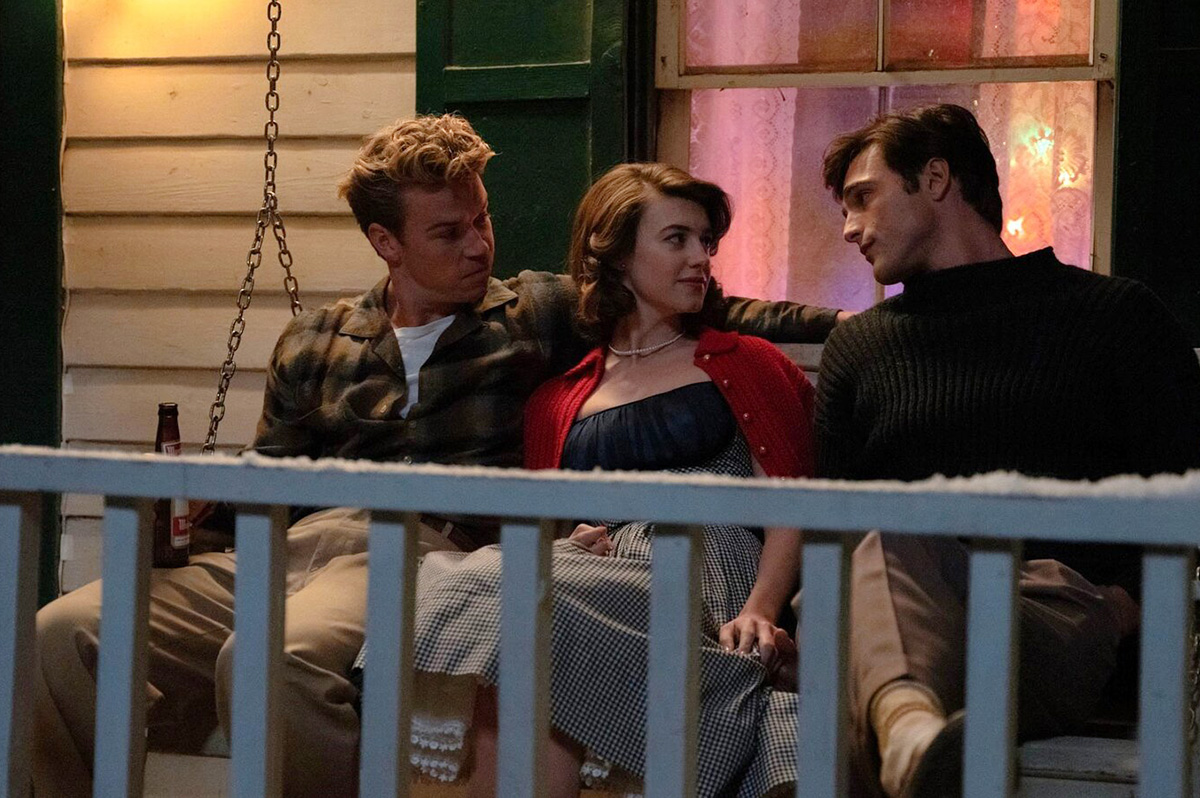
You might not know it from the publicity campaign, but the latest big-screen project for breakout “Euphoria” actor and sex symbol Jacob Elordi is 100% a gay love story.
Alright, perhaps that’s not entirely accurate. “On Swift Horses” – adapted from the novel by Shannon Pufahl and directed by Daniel Minahan from a screenplay by Bryce Kass – actually splits its focus between two characters, the other of which is played by “Normal People” star Daisy Edgar-Jones; but since that story arc is centered around her own journey toward lesbian self-acceptance, it’s unequivocally a “Queer Movie” anyway.
Set in 1950s America, at the end of the Korean War, it’s an unmistakably allegorical saga that stems from the marriage between Muriel (Edgar-Jones) and Lee (Will Poulter), a newly discharged serviceman with dreams of building a new life in California. His plans for the future include his brother Julius (Elordi), a fellow war vet whose restlessly adventurous spirit sparks a kindred connection and friendship with his sister-in-law despite a nebulously strained dynamic with Lee. Though the newlyweds follow through with the plan, Julius opts out in favor of the thrill of a hustler’s life in Las Vegas, where his skills as a card shark gain him employment in a casino. Nevertheless, he and Muriel maintain their friendship through correspondence, as he meets and falls in love with co-worker Henry (Diego Calva) and struggles to embrace the sexual identity he has long kept secret. Meanwhile, Muriel embarks on a secret life of her own, amassing a secret fortune by gambling on horse races and exploring a parallel path of self-acceptance with her boldly butch new neighbor, Sandra (Sasha Calle), as Lee clings obliviously to his dreams of building a suburban family life in the golden era of all-American post-war prosperity.
Leisurely, pensive, and deeply infused with a sense of impossible yearning, it’s the kind of movie that might easily, on the surface, be viewed as a nostalgia-tinged romantic triangle – albeit one with a distinctively queer twist. While it certainly functions on that level, one can’t help but be aware of a larger scope, a metaphoric conceit in which its three central characters serve as representatives of three conflicting experiences of the mid-century “American Dream” that still looms large in our national identity. With steadfast, good-hearted Lee as an anchor, sold on a vision of creating a better life for himself and his family than the one he grew up with, and the divergent threads of unfulfilled longing that thwart his fantasy with their irresistible pull on the wife and brother with whom he hoped to share it, it becomes a clear commentary on the bitter reality behind a past that doesn’t quite gel with the rose-colored memories still fetishized in the imagination of so many Americans.
Fortunately, it counterbalances that candidly expressed disharmony with an empathetic perspective in which none of its characters is framed as an antagonist; rather, each of them are presented in a way with which we can readily identify, each following a still-unsatisfied longing that draws them all inexorably apart despite the bonds – tenuous but emotionally genuine – they have formed with each other. To put it in a more politically-centered way, the staunch-but-naive conformity of Lee, in all his patriarchal tunnel vision, does not make him a villainous oppressor any more than the repressed queerness of Muriel and Julius make them idealized champions of freedom; all of them are simply following an inner call, and each can be forgiven – if not entirely excused – for the missteps they take in response to it
That’s not to say that Minahan’s movie doesn’t play into a tried-and-true formula; there’s a kind of “stock character” familiarity around those in the orbit of the three main characters, leading to an inevitably trope-ish feel to their involvement – despite the finely layered performances of Calva and Calle, which elevate their roles as lovers to the film’s two queer explorers and allow them both to contribute their own emotional textures – and occasionally pulls the movie into the territory of melodrama.
Yet that larger-than-life treatment, far from cheapening “On Swift Horses,” is a big part of its stylish appeal. Unapologetically lush in its gloriously photographed recreation of saturated 1950s cinema (courtesy of Director of Photography Luc Montpellier), it takes us willingly into its dream landscape of mid-century America – be it through the golden suburbs of still-uncrowded Southern California or the neon-lit flash of high-rolling Las Vegas, or even the macabre (but historically accurate) depiction of nuclear-age thrill-seekers convening for a party in the Nevada desert to watch an atom bomb detonate just a few short miles away. It’s a world remembered by most of us now only through the memories and artifacts of a former generation, rendered with an artful blend of romance and irony, and inhabited by people in whom we can see ourselves reflected while marveling at their beauty and charisma.
As lovely as the movie is to look at, and as effective as it is in evoking the mix of idealism and disillusionment that defines the America of our grandparents for many of us at the start of the second quarter of the 21st century, it’s that last factor that gives Minahan’s film the true “Hollywood” touch. His camera lovingly embraces the beauty of his stars. Edgar-Jones burns with an intelligence and self-determination that underscores the feminist struggle of the era, and the director makes sure to capture the journey she charts with full commitment; Poulter, who could have come off as something of a dumb brute, is allowed to emphasize the character’s nobility over his emotional cluelessness; Calle is a fiery presence, and Minahan lets her burn in a way that feels radical even today; Calva is both alluring and compelling, providing an unexpected depth of emotion that the film embraces as a chord of hope.
But it is Elordi who emerges to truly light up the screen. Handsome, charismatic, and palpably self-confident, he’s an actor who frankly needs to do little more than walk into the scene to grab our attention – but here he is given, perhaps for the first time, the chance to reveal an even greater depth of sensitivity and truth, making his Julius into the film’s beating heart and undisputed star. It’s an authenticity he brings into his much-touted love scenes with Calva, lighting up a chemistry that is ultimately as joyously queer-affirming as they are steamy.
Which is why Sony Pictures’ promotions for the film – which avoid directly referencing the sexuality of its two main characters, instead hinting at “secret desires” and implying a romantic connection between Elordi and Edgar-Jones – feels not just like a miscalculation, but a slap in the face. Though it’s an eloquent, quietly insightful look back at American cultural history, it incorporates those observations into a wistful, bittersweet, but somehow impossibly hopeful story that emphasizes the validity of queer love.
That’s something to be celebrated, not buried – which makes “On Swift Horses” a sure bet for your must-see movie list.
-
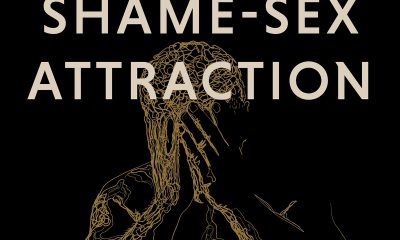
 Books4 days ago
Books4 days agoChronicling disastrous effects of ‘conversion therapy’
-

 U.S. Federal Courts3 days ago
U.S. Federal Courts3 days agoSecond federal lawsuit filed against White House passport policy
-

 Opinions3 days ago
Opinions3 days agoWe must show up to WorldPride 2025 in D.C.
-
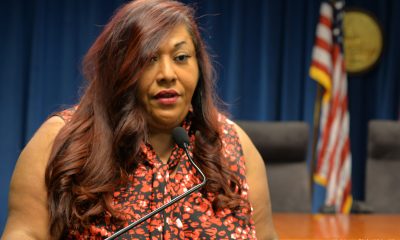
 District of Columbia3 days ago
District of Columbia3 days agoRuby Corado sentencing postponed for third time













